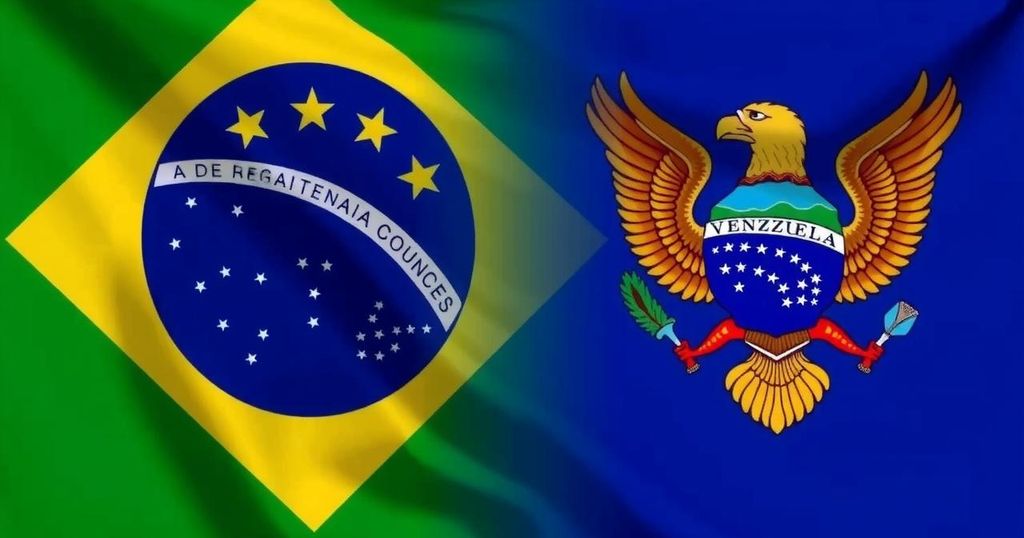Venezuela Reclaims Diplomatic Ties Amidst BRICS Membership Dispute with Brazil

Venezuela has recalled its ambassador from Brazil after Brazil vetoed its application to join the BRICS alliance, citing “interventionist” behavior by Brazilian officials. This incident amplifies tensions stemming from Brazil’s refusal to recognize President Maduro’s election victory, amidst claims of electoral fraud and violent protests in Venezuela. The diplomatic spat reflects broader geopolitical complexities in South America.
Venezuela has officially recalled its ambassador from Brazil in response to Brazil’s refusal to support Caracas’s recent application to join the BRICS coalition of prominent developing nations. Venezuela’s Foreign Ministry publicly condemned Brazilian officials for what it described as “blocking” its accession to BRICS and for dishing out “interventionist, rude statements”. This diplomatic action follows Brazil’s decision, during the last summit held in Kazan, Russia, to veto Venezuela’s aspirations, eliciting strong reactions from Caracas. This escalation in bilateral tensions reveals underlying friction between the two neighboring South American countries, especially after Venezuelan President Nicolas Maduro’s controversial self-declaration as the victor of the July elections, which Brazil’s President Lula da Silva has refused to acknowledge. President Silva has urged Venezuelan electoral authorities to provide official vote counts. Furthermore, the Venezuelan government has publicly denounced Brazil’s foreign policy advisor, Celso Amorim, portraying him as a “messenger for North American imperialism” for his remarks suggesting that Venezuela had undermined the trust of its BRICS partners. The current situation is even more complex following a series of violent protests in Venezuela after the contentious elections, which reportedly resulted in the deaths of at least 23 individuals, according to a Human Rights Watch report. Additionally, the Venezuelan opposition has raised concerns regarding the legitimacy of the election results, maintaining that their candidate, Edmundo Gonzalez, emerged as the true victor of the elections after offering detailed evidence from polling stations, a claim that external observers from several Latin American countries and the United States have supported. In a dramatic turn of events, Gonzalez has since fled to Spain, seeking asylum as Venezuelan authorities launch a crackdown on dissenters, further complicating the political landscape of the region.
The BRICS alliance, composed of Brazil, Russia, India, China, and South Africa, alongside new members such as Iran, Egypt, Ethiopia, and the United Arab Emirates, represents a major platform for cooperation among developing nations. Venezuela, under the leadership of President Nicolas Maduro, has aimed to join this grouping to bolster its international presence and economic state. However, its recent elections have sparked significant controversy and accusations of electoral fraud, dividing opinion across the region and influencing its foreign relations, particularly with Brazil, which has historically held a significant diplomatic role in South America. The diplomatic rift over Venezuela’s BRICS membership bid and the political circumstances within Venezuela illustrate the complexities of intergovernmental relations in a context marked by divergent political ideologies and historical alliances.
The recalled ambassador incident between Venezuela and Brazil underscores the deteriorating diplomatic relations exacerbated by Venezuela’s contested electoral process and its stalled ambitions to join BRICS. Brazil’s refusal to recognize Maduro’s election results further complicates regional dynamics, which are already fraught with accusations of imperialist influences and violent domestic unrest stemming from the election’s aftermath. Through this unfolding situation, both nations face the challenge of navigating their diplomatic engagements amidst domestic turmoil and conflicting political narratives.
Original Source: www.aljazeera.com







